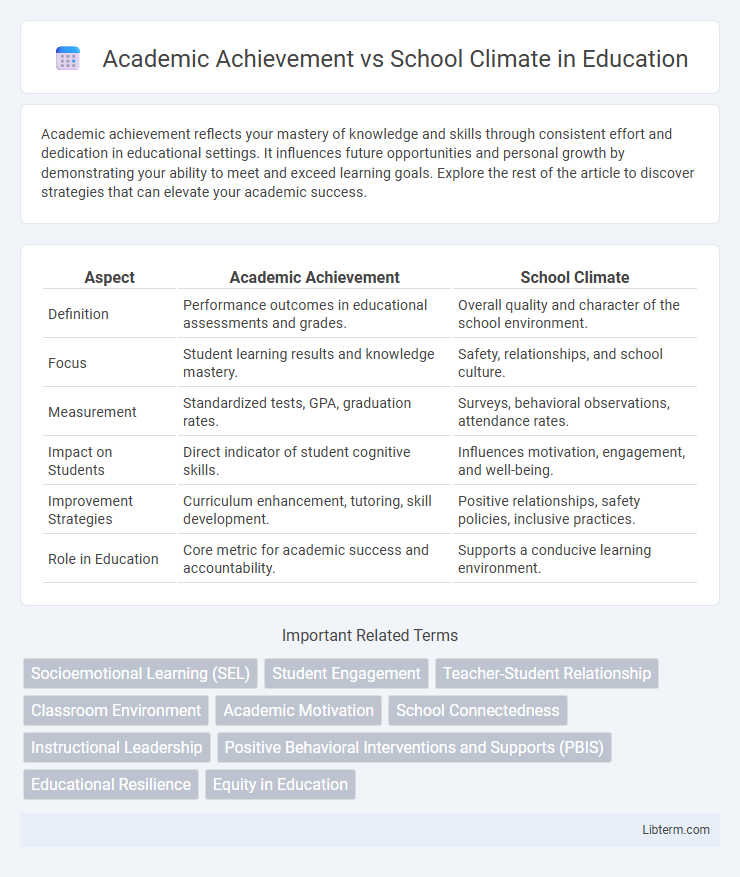Academic achievement reflects your mastery of knowledge and skills through consistent effort and dedication in educational settings. It influences future opportunities and personal growth by demonstrating your ability to meet and exceed learning goals. Explore the rest of the article to discover strategies that can elevate your academic success.
Table of Comparison
| Aspect | Academic Achievement | School Climate |
|---|---|---|
| Definition | Performance outcomes in educational assessments and grades. | Overall quality and character of the school environment. |
| Focus | Student learning results and knowledge mastery. | Safety, relationships, and school culture. |
| Measurement | Standardized tests, GPA, graduation rates. | Surveys, behavioral observations, attendance rates. |
| Impact on Students | Direct indicator of student cognitive skills. | Influences motivation, engagement, and well-being. |
| Improvement Strategies | Curriculum enhancement, tutoring, skill development. | Positive relationships, safety policies, inclusive practices. |
| Role in Education | Core metric for academic success and accountability. | Supports a conducive learning environment. |
Introduction to Academic Achievement and School Climate
Academic achievement reflects students' proficiency in core subjects, measured through grades, standardized test scores, and graduation rates. School climate encompasses the quality and character of school life, including safety, relationships, teaching practices, and school environment. Research highlights that a positive school climate enhances student motivation, engagement, and academic success, linking social-emotional factors to educational outcomes.
Defining Academic Achievement
Academic achievement refers to the measurable performance outcomes of students in educational settings, often assessed through standardized tests, grades, and graduation rates. It encompasses cognitive skills, subject mastery, and the ability to apply knowledge, which serve as key indicators of student success. Strong academic achievement correlates with positive future academic and career opportunities, making it a central focus in educational research and policy.
Understanding School Climate
School climate encompasses the quality and character of school life, including relationships, teaching practices, and organizational structures, which significantly influence students' academic achievement. Positive school climate fosters a safe, supportive environment that enhances student engagement, motivation, and cognitive development, leading to improved academic outcomes. Research shows that schools with strong social support, clear expectations, and inclusive practices report higher student performance and reduced behavioral problems.
The Relationship Between School Climate and Student Outcomes
Positive school climate significantly enhances academic achievement by fostering student engagement, motivation, and a sense of safety. Research indicates that supportive teacher-student relationships and an inclusive environment contribute to higher test scores and improved attendance rates. Schools with a strong climate see reduced behavioral problems, which correlates with better overall student outcomes and academic success.
Factors Influencing Academic Achievement
Academic achievement is influenced by multiple factors including the quality of teaching, student engagement, and availability of learning resources. School climate, encompassing safety, teacher-student relationships, and peer support, plays a critical role in creating an environment conducive to learning. Positive school climate correlates with higher academic performance by fostering motivation, reducing absenteeism, and promoting social-emotional well-being.
Elements that Shape a Positive School Climate
Elements that shape a positive school climate include supportive teacher-student relationships, clear behavioral expectations, and an inclusive environment promoting respect and safety. Consistent recognition of student achievements and active family involvement further enhance motivation and engagement. These factors collectively contribute to improved academic achievement by fostering a sense of belonging and reducing behavioral issues.
School Climate’s Impact on Learning and Motivation
School climate significantly influences academic achievement by fostering a supportive and safe environment that enhances student motivation and engagement. Positive school climate, characterized by respectful teacher-student relationships and inclusive peer interactions, promotes emotional well-being and encourages active participation in learning. Research shows that schools with strong climates report higher attendance rates, improved academic performance, and increased student motivation.
Comparing Academic Achievement Across Different School Climates
Academic achievement varies significantly across different school climates, with positive, supportive environments correlating with higher student performance. Schools that foster inclusivity, respect, and strong teacher-student relationships often report improved standardized test scores and graduation rates. Conversely, negative climates marked by bullying or disengagement tend to hinder academic success and lower overall student achievement metrics.
Strategies to Improve Both Academic Achievement and School Climate
Implementing restorative justice practices fosters a positive school climate while enhancing student engagement and academic achievement. Integrating social-emotional learning (SEL) programs equips students with skills that improve behavior and academic performance. Collaborative teacher professional development tailored to culturally responsive pedagogy strengthens instructional quality and nurtures an inclusive, supportive school environment.
Conclusion: Balancing School Climate and Academic Success
Balancing school climate and academic achievement requires fostering a positive, inclusive environment that supports student well-being alongside rigorous academic standards. Research indicates that schools with strong community engagement, supportive teacher-student relationships, and safe atmospheres consistently see higher academic performance. Prioritizing both social-emotional learning and curriculum excellence creates sustainable success for diverse student populations.
Academic Achievement Infographic

 libterm.com
libterm.com